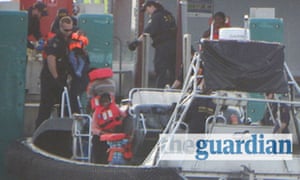Sri Lankan asylum seeker tells of terror on Nauru: 'If I am sent back, I will commit suicide'
Durga, who has a two decade-long history of torture and trauma, was brought to a detention centre on the Australia mainland after allegedly being raped on Nauru. But a high court challenge on Wednesday could see her sent back to the place she fears
Durga was one of 157 Tamil asylum seekers on board a boat that was intercepted by an Australian customs vessel in July 2014. They were held on board the Australian ship for a month while the Australian government tried to return the people to India, but India refused them and they were transferred to Nauru. Photograph: Michael Safi for the Guardian
An asylum seeker brought to Australia after she was allegedly drugged and sexually assaulted on Nauru has spoken of her terror at the prospect of being sent back to the island.
Durga* a Sri Lankan Tamil, has a two decade-long history of torture and trauma, including rape, both in Sri Lanka and while in the Australian-run detention on Nauru, but faces the possibility of being returned to the Pacific island’s detention centres pending a high court challenge on Wednesday.
“I am too scared to go back to that place, my life will not be safe,” she told Guardian Australia through an interpreter from immigration detention on the Australian mainland. “If I am sent back to Nauru, I will commit suicide.”
Durga is one of 267 asylum seekers – including 72 children and 33 babies born in Australia – who could be removed to Nauru on 72 hours’ notice, if the high court decides on Wednesday it is within the government’s constitutional powers to detain people offshore.
Several of the asylum seekers at risk of being sent back to Nauru have told Guardian Australia they fear going back to the island, regardless of the status of the centres, saying they will be attacked there, or sexually assaulted, or that they will not receive required medical care.
Durga is one.
In 1996 in the northern Sri Lankan city of Jaffna, she was arrested by military officers who suspected her of links to the separatist Liberation Tigers of Tamil Eelam (LTTE). Durga was 22 and had undergone, as almost all teenagers had, basic training with the LTTE. But she told Guardian Australia: “I was never a fighter, I was only involved in political activities.”
Durga says she was beaten and tortured, despite being pregnant, and gave birth to her son while in military custody. She was held for two years without charge or trial, before escaping to Colombo. Her husband disappeared while she was detained and has not been seen since. He is presumed dead, one of the tens of thousands “disappeared” during Sri Lanka’s civil war.
In Colombo, having been visited by friends from Jaffna, Durga was arrested again by military intelligence, interrogated and tortured. Even after being released, Durga says, she was almost routinely raped by the state’s security personnel.
“The military officers would come to my house. Every time they would come two or three men, they would grab me and force me to have sex with them. They expected me to cooperate, but I never did. I would resist. So they would tear my clothes from me, they would tie my hands and they would push clothes in my mouth so I could not scream. Then they would rape me,” she said.
“I am too scared to go back to that place, my life will not be safe,” she told Guardian Australia through an interpreter from immigration detention on the Australian mainland. “If I am sent back to Nauru, I will commit suicide.”
Durga is one of 267 asylum seekers – including 72 children and 33 babies born in Australia – who could be removed to Nauru on 72 hours’ notice, if the high court decides on Wednesday it is within the government’s constitutional powers to detain people offshore.
Several of the asylum seekers at risk of being sent back to Nauru have told Guardian Australia they fear going back to the island, regardless of the status of the centres, saying they will be attacked there, or sexually assaulted, or that they will not receive required medical care.
Durga is one.
In 1996 in the northern Sri Lankan city of Jaffna, she was arrested by military officers who suspected her of links to the separatist Liberation Tigers of Tamil Eelam (LTTE). Durga was 22 and had undergone, as almost all teenagers had, basic training with the LTTE. But she told Guardian Australia: “I was never a fighter, I was only involved in political activities.”
Durga says she was beaten and tortured, despite being pregnant, and gave birth to her son while in military custody. She was held for two years without charge or trial, before escaping to Colombo. Her husband disappeared while she was detained and has not been seen since. He is presumed dead, one of the tens of thousands “disappeared” during Sri Lanka’s civil war.
In Colombo, having been visited by friends from Jaffna, Durga was arrested again by military intelligence, interrogated and tortured. Even after being released, Durga says, she was almost routinely raped by the state’s security personnel.
“The military officers would come to my house. Every time they would come two or three men, they would grab me and force me to have sex with them. They expected me to cooperate, but I never did. I would resist. So they would tear my clothes from me, they would tie my hands and they would push clothes in my mouth so I could not scream. Then they would rape me,” she said.

